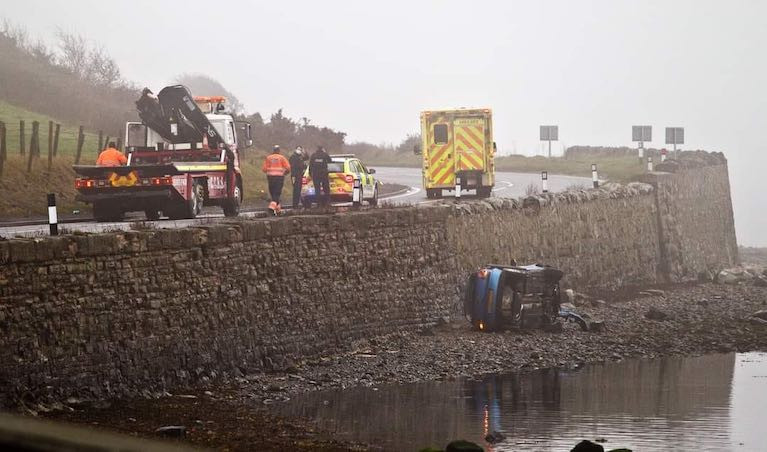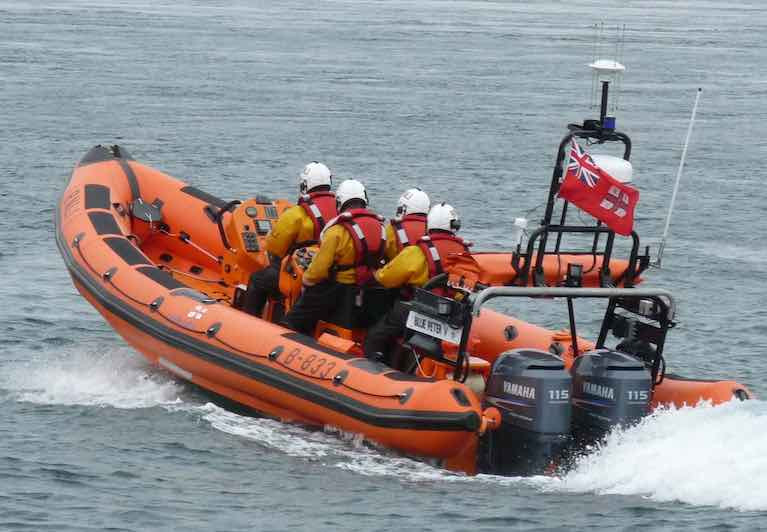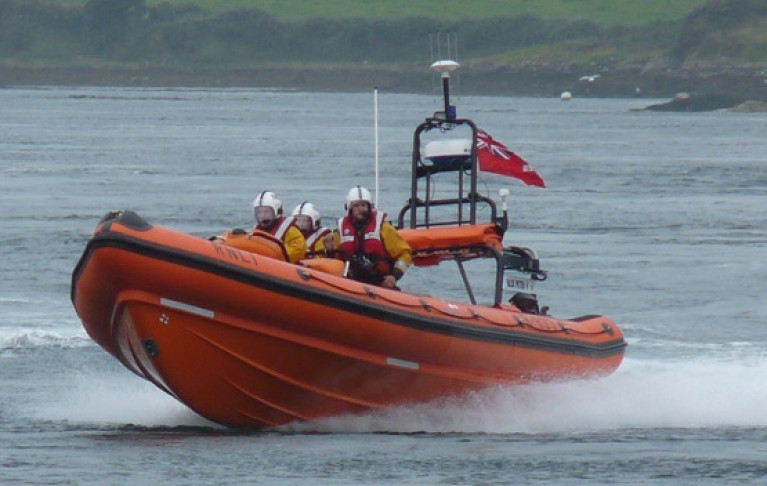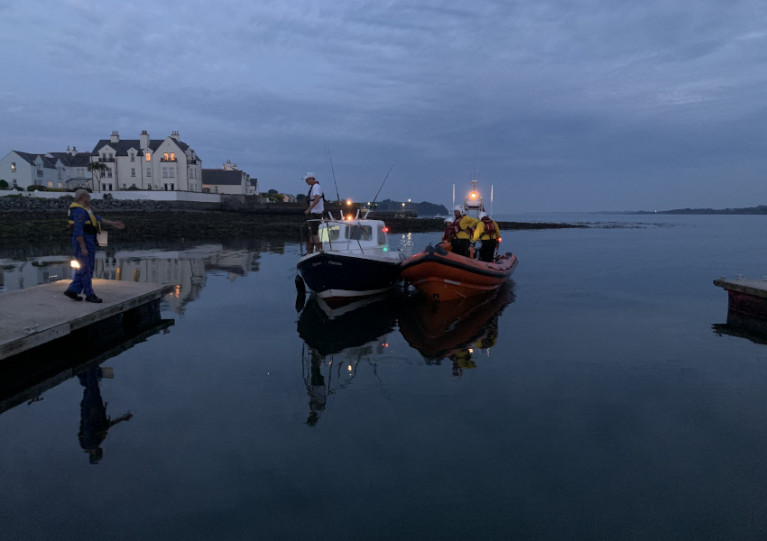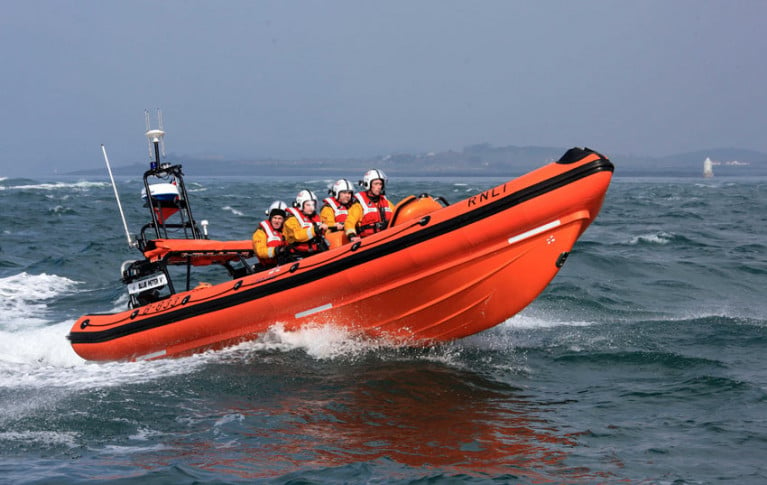Displaying items by tag: Portaferry
Portaferry Coastguard Rescue Team had a busy evening yesterday (27th April) with a callout to Kirkistown Spit, near the village of Cloughey on the east Co Down coast
The crew were on station training when called to the scene where two people had been cut off by the rising tide. It became clear that the female was up to chest depth and in immediate danger.
Coastguard Rescue officers entered the water and helped the two people back ashore, and the female was checked by paramedics before making her way home.
Also present were Bangor Coastguard Rescue Team and Portaferry RNLI crew, who stood by for safety cover.
Yacht Call Out for Portaferry RNLI Lifeboat on Strangford Lough
Portaferry RNLI lifeboat crew was called out on 22nd April to a yacht with engine failure at the entrance to Strangford Lough.
The entrance at the southern end of the Ards Peninsula leads to the Strangford Narrows through which the tide flows at about 8 knots, and with an uneven bottom, rough seas can result. Portaferry and its Marina lie on the eastern side of the Narrows, and the Strangford ferry runs between here and the village of Strangford on the western side.
The casualty vessel was sailing towards Portaferry but did the right thing and called for help early, knowing that they would need assistance when coming alongside. The lifeboat took the vessel under tow and ensured their safe arrival at the Portaferry marina.
Commenting on the call-out, helmsman Simon said, "While not in any immediate danger, the men certainly took the right course of action today calling for help once they realised that they had an issue. We were delighted to help and would urge anyone considering going to sea to take all necessary precautions and respect the water".
Yesterday afternoon (11th April) Portaferry Coastguard Rescue Team had what turned out to be an Accident Prevention call out.
At Cloughey on the east coast of the Ards Peninsula in Co Down, a dog had entered the water to chase seagulls, (maybe bored with Lockdown?) but ended up quite a distance from the shore.
The owner was thinking of going into the water to rescue the dog, but he did the correct thing and stayed out of the water. Instead, he dialled 999 to ask for help. When the Team arrived, the dog was swimming ashore back to its owner. After some doggie treats and a stern telling off, it was on its way home to dry off.
Portaferry Coastguard Rescue Team was paged on Saturday along with Newcastle Coastguard after a report that seven people were stranded by the tide on Guns Island, off the southeastern County Down coast near Ballyhornan.
Two Coastguard Rescue officers in water rescue equipment made their way out to the island to reassure the four adults and two children, but the incoming tide made it impossible to walk ashore, so Portaferry Lifeboat was called, and all seven were taken to safety.
Belfast Coastguard Alerted to Car on Portaferry Shore
The Portaferry Coastguard Rescue team was alerted by Belfast Coastguard yesterday to attend the scene of a serious incident when a car had left the Portaferry Road near Newtownards and ended up on the shore.
The road which runs from Newtownards at the head of Strangford Lough to Portaferry at the southern end skirts the Lough and was closed for a time.
The three occupants were rescued by members of the public before the emergency services arrived and were taken to hospital to be checked out after this serious incident.
Portaferry’s Exploris Aquarium Faces Uncertain Future As Belfast Competitor Gets Go-Ahead
Portaferry’s Exploris aquarium may soon face competition from a £12 million competitor in Belfast’s Titanic Quarter — and a battle for its own future, as the News Letter reports.
Belfast City councillors on the planning committee gave their approval for the ‘reefLife’ project on Wednesday — despite Ards and North Down Council raising their objections with Stormont’s Infrastructure Minister.
Exploris has faced financial challenges for years, and received an emergency lifeline from the Executive after it was earmarked for closure in 2013.
Now it’s feared the new Belfast aquarium plans would have “wider ramifications” for the Co Down seaside town, and have a “a devastating impact” on Exploris and its marine wildlife sanctuary on the Ards Peninsula.
The News Letter has more on the story HERE.
Portaferry RNLI Rescues Two Sailors after 36ft Yacht Gets into Difficulty on Strangford Lough
Portaferry RNLI came to the aid of two sailors whose 36ft yacht got into difficulty on Strangford Lough this morning (Tuesday 25 August).
The volunteer crew were requested to launch their inshore lifeboat at 9.55 am following a report from Belfast Coastguard that a 36ft yacht with two people onboard was dragging its anchor and drifting towards the shore.
The lifeboat helmed by Fergal Glynn and with crew members Ian Sands, Josh Boyd, and Rosalind Watret onboard, launched immediately and made its way to the scene.
Weather conditions at the time were poor with heavy rain, a southeasterly Force 7 wind and a choppy sea. Visibility was fair.
Due to the weather conditions, a decision was made to also request the all-weather lifeboat from Donaghadee RNLI. A local vessel also offered its assistance.
Once on scene, Portaferry RNLI assessed the situation and observed that the yacht was drifting close to shore off Taggart Island. The man and woman onboard were safe and well. A lifeboat crew member was transferred to the yacht where they took a line to the vessel to take the weight off the anchor. Once this was completed the inshore lifeboat proceeded to tow the yacht back to Killyleagh. Donaghadee RNLI was subsequently stood down.
Speaking following the call out, Philip Johnston, Portaferry RNLI Lifeboat Operations Manager said: ‘Weather conditions at sea were not good this morning and the crew onboard the yacht did the right thing calling for help when they knew they were in difficulty and we would like to wish them a safe onward journey.
‘Ahead of sailing, we would remind people to always respect the water. Always wear a lifejacket and always have a means of calling for help or signalling and ensure everyone onboard knows how to use it. Always check the weather forecast and tide times. Make sure someone on the shore knows where you are going and when you are due back. Should you get into difficulty, dial 999 or 112 and ask for the Coastguard.’
Portaferry Lifeboat Launches To Kayaker In Difficulty
Portaferry RNLI rescued a kayaker who got into difficulty on Strangford Lough on Wednesday night (5 August).
The volunteer crew were on the scene with the inshore lifeboat just eight minutes after launch, following an alert from passers-by who heard the kayaker calling for help at Walter Rock in the Strangford Narrows.
Directed by those members of the public, the lifeboat reached the casualty who had been in the water for between 15 and 30 minutes, clinging to his upturned kayak.
He was taken onboard the lifeboat and made comfortable before being returned to shore and passed into the care of Portaferry Coastguard. The lifeboat crew then returned to the Narrows to recover the kayak.
Speaking after the callout, Portaferry RNLI press officer Jordan Conway said: “We would like to commend the members of the public who raised the alarm last night which ensured we reached the casualty in good time.
“As the summer season continues, we remind everyone planning a trip to sea to always respect the water.
“Always carry a means of calling for help and keep it within reach. Wear a personal flotation device and check the weather and tides.
“Tell someone where you are going and when you are due back and always wear appropriate clothing for the conditions and your trip.”
Portaferry Lifeboat Launches Twice In Three Days To Reports Of Strangford Lough Breakdowns
Portaferry RNLI launched twice in three days to reports of broken down boats in the same area of Strangford Lough.
Portaferry’s volunteer crew launched initially on Thursday evening (25 June) at 9.50pm to assist a five-metre cabin cruiser at the entrance to Strangford Lough which had suffered engine failure after a fishing trip.
The inshore lifeboat towed the vessel to Portaferry Marina, handed the vessel to the local coastguard and assisted with berthing.
Portaferry’s lifeboat volunteers launched again yesterday afternoon (Saturday 27 June) at 5.07pm to tow to safety a seven-metre RIB which had suffered engine failure at the south end of Rock Angus, at the beginning of Strangford Lough.
Commenting on the callouts, lifeboat helm Colin Conway said: “As this is a busy period for Portaferry RNLI, we ask you to remember to have all your communication devices in good working order, to follow safety advice to stay as safe as you can, and always to respect the water.”
As Father’s Day (Sunday 21 June) wound down, Portaferry RNLI’s lifeboat volunteers were paged following reports of an upturned boat off Ardglass in Co Down, Northern Ireland.
The crew launched promptly at 9.17pm in cloudy but good visibility conditions and swiftly made their way to Ardglass.
Arriving on scene around half an hour later, the crew began searching the area for the upturned boat — but soon discovered that the sighting was in fact of a dead whale that was floating on the surface of the Irish Sea.
Commenting on the callout, deputy launching authority Graham Edgar said: “This was an unfortunate conclusion of the search. However we are glad that no lives were in danger.
“Belfast Coastguard will report the whale as a hazard to navigation to ensure all other vessels in the area will be aware of the remains.”



























